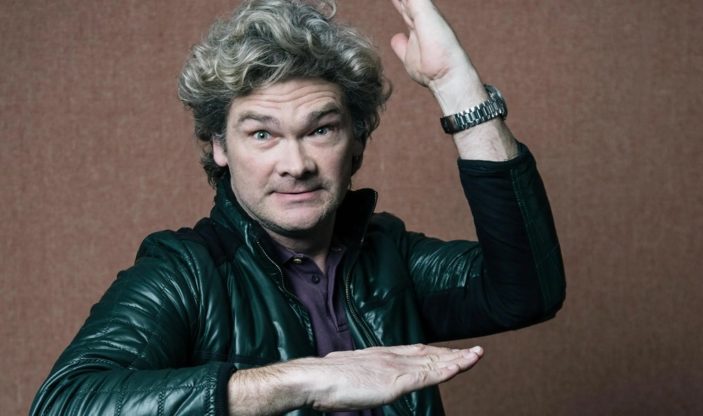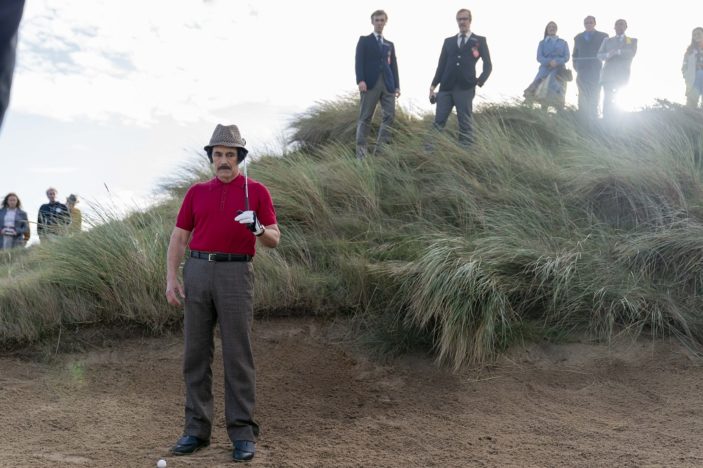
A writer and performer whose resume boasts such acclaimed works as The Mighty Boosh, Horrible Histories, and both Paddington films, Simon Farnaby and the comedy genre practically go hand-in-hand.
For his latest big screen outing, the English creative is adapting his own work, bringing his musings on infamous golfer Maurice Flitcroft to life with The Phantom of the Open, based off his own book about “the world’s worst golfer”.
Bringing a light to a figure more people should know about, and leaning his comedy stylings towards laughing with his subject rather than at him, Farnaby spoke with our own Peter Gray ahead of the film’s release (you can read our review here) about uncovering the rather hidden details of Maurice’s life, which comedies have proven formative to him as a writer, and why being a writer was a better career choice than exploring golf.
Before I get to Phantom of the Open, I have to note, quite funnily enough, I watched Your Highness the other night, before I knew I was even talking to you, and then realised after the fact that you were in that film. I thought it was quite a funny coincidence, and I don’t know how you feel about that film but I personally think it’s hilarious.
I had a great time doing it. I became pals with Danny McBride and David Gordon Green and that gang. We didn’t really know much about them – and by we I mean myself, Damian Lewis and Toby Jones – and we just thought “Who are these guys?”, but then I watched Eastbound & Down and knew they were amazing. I love the film, but it really tanked in the U.S. at the box office. I just don’t know if (audiences) got what they were going for.
Well I actually spoke to David Gordon Green around the time of Halloween Kills, and I mentioned it to him and he seemed quite enthusiastic about knowing it had at least one fan (laughs).
Manious the Bold was my character, and he’s one of my favourites. We did a lot of improvising in that movie, but it all ended up on the cutting room floor.
This movie though, The Phantom of the Open, is so charming. I have to imagine one of the most attractive components was the character of Maurice and that he is someone who deserves to be celebrated. Apart from the story itself, was he, as a person, someone that drew you to this?
Oh very much so, yeah. I grew up around golf, so I was aware of him and I thought it was quite funny that there’s this guy who’s in the Open but couldn’t play. It was a funny concept. When I was a junior I wanted to be a professional golfer. I got quite good but not good enough to join the tour, so I got into acting and writing and comedy. I got a lot more girlfriends that way too (laughs). It was a good career choice.
But when (Maurice) died in 2007 I read his obituaries in all the newspapers, and I remember thinking how I knew of him. Reading the quotes about him, which were from his press conferences, which are actually in the movie. He said “Well, I would’ve done better if I hadn’t left my 4 in the boot of the car” (laughs) just things like that. I loved his positivity during that humiliation. That, to me, would be my worst nightmare. I have dreams where I’m on stage and I’ve forgot my lines and everyone is looking at me, and that’s kinda like the situation Maurice put himself in. He carried it off with great aplomb and dignity.
As you said you read his obituary and that inspired this look into his life. Did writing the book and then adapting it come about quite quickly?
It was quite a quick process. I immediately wanted to write a movie. I knew it would make a good movie. In quite a Flitcroftian effort, I wrote the screenplay based on what little information there was out there. That was quite a bad idea, because I had to fill in a lot of the gaps with un-truths. A friend of mine, a sports journalist, said “Why don’t we do a book first?”, and that way we could take our time in getting the information on this guy. There wasn’t a lot about him on-line. Everything that’s there we’ve done that. So I wrote a screenplay, wrote the book, then wrote a better screenplay. We found his unpublished autobiography too, so that was a real key. His disco-dancing sons had a box with some of Maurice’s (belongings) and there was this 500-page, hand-written book with just everything in it. What he was thinking, what he wanted to achieve…so that was a huge moment in getting a greater insight into his character.
You have quite a way when writing comedy that’s very naturalistic. Could you speak more on finding the comedy that isn’t so obvious. You have disco-dancing sons and this guy who weasels into the Open without any other intention than because he simply wants to play, and this is material that could be so broadly presented. How do you find that tone where it’s more subtle?
Speaking to you I can reference this because there’s this film called The Castle, which you should know, that’s a favourite of mine. It has this deadpan delivery to it, and the characters are a certain class. I feel like I understand that being from the North of England, same as Maurice. I didn’t want to laugh at him. I didn’t think that would be funny. I just wanted it to be real. From the first screenplay there’s a lot more physical comedy, but meeting his friends and family when writing the book I realised I had a responsibility to tell the story as true as I could. That’s where Mark Rylance really helped too. He would say “No, I think that’s a bit too silly”, and that helped guide it. Mark didn’t want to go for laughs that weren’t naturally there in Maurice’s story. It’s not Caddyshack (laughs).

Mark Rylance really is so endearing in this. Was he someone you envisioned when writing?
No. I usually have someone in mind when writing, but I had Maurice in mind because I was watching footage, so he was the voice I had in my head. When we were interviewing for directors, Craig (Roberts) said “What about Mark Rylance?”
I love Mark and I thought yes if we could get him. I hadn’t known Mark to do comedy, or even lead (a film). I know he’d done stuff with Spielberg, and I think he said he was the greatest actor in the world, so when Craig got him he said “We have the best actor in the world” (laughs). He’s amazing and he just threw himself into it, and he felt the same responsibility to (Maurice’s) family to put a fair depiction of Maurice on the screen.
Off the mention of his family, I really appreciated that as much as this film was about his career, his family is just as important a focus, if not more so. Was that a component who knew you wanted to specifically focus on?
Yeah, it was. What I found amazing when we went deep into the research of his family, they were such a large part of him. They’re an off-shoot of him in that they too reached for the stars. You’re right in that it’s not really about golf at all.
And you having such a long relationship with comedy, was there a performer or a film that sticks out for you as a source of inspiration in you wanting to explore the genre?
There’s a film called Withnail and I which was a big one for me. I have an older brother, Paul, who was really into film. That’s really useful to have (laughs) and he introduced me to that film when I was about 13 and it had a huge impact on me. I would say Caddyshack and Airplane (too), just silly stuff, but in terms of tone I would said Withnail and I and The Castle.
Well now that we know you like golf and you’ve made a golfing movie, maybe a Caddyshack remake is on the cards?
Hey, that’s not a bad idea. I mean they keep remaking all this stuff. We’ve got about 12 Batmans at this point…
What’s another Caddyshack?
Exactly.
The Phantom of the Open is screening in Australian theatres from July 14th, 2022, following advance screenings from the 7th-10th July.
